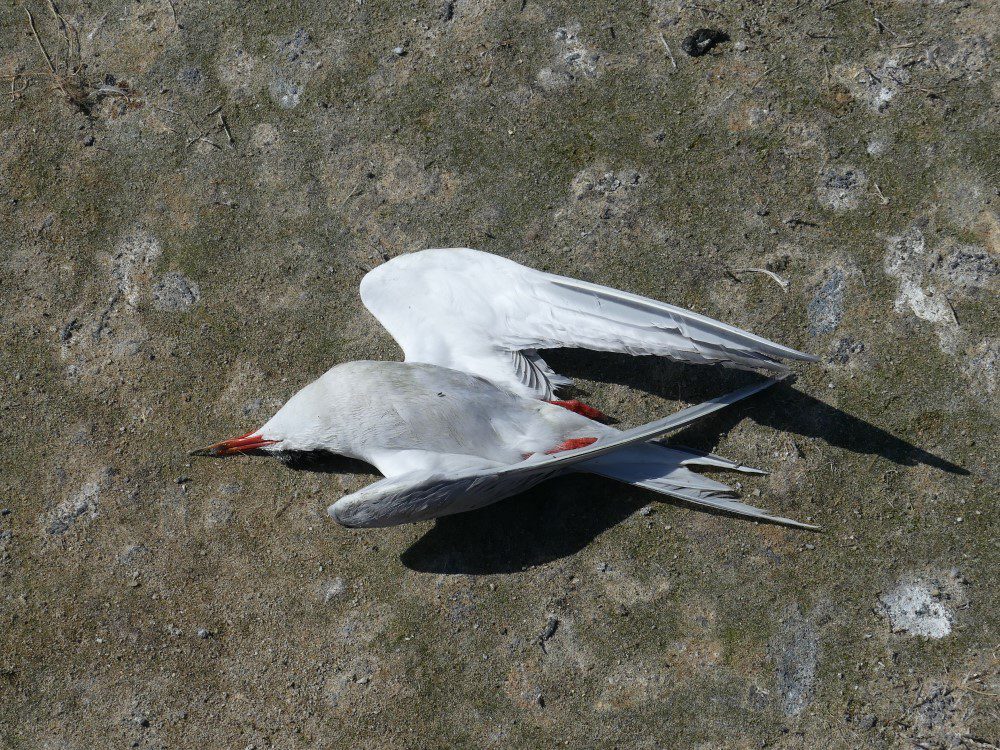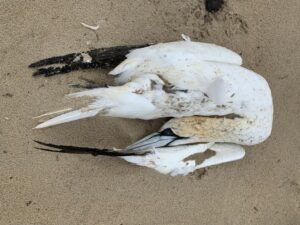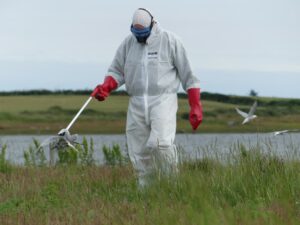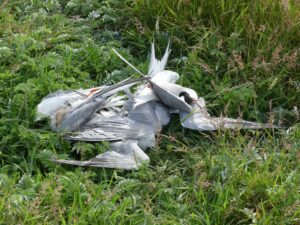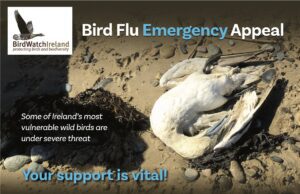BirdWatch Ireland has intensified its call on the government to ramp up its response as the highly-pathogenic H5N1 strain of avian influenza spreads to new bird populations around the country.
While initially concentrated on tern populations, the highly-contagious avian flu or ‘bird flu’ is now showing up in other species, with reports of dead Guillemots and Gannets on beaches in Dublin and Wicklow in recent weeks, according to Senior Seabird Conservation Officer, Dr. Stephen Newton.
Dead Gannet on Morriscastle Beach, a victim of avian influenza
(Photo: John O’Brien)
Before now, known cases of avian flu during the 2023 nesting season were largely concentrated on the tern colonies at Lady’s Island Lake in Wexford and Rockabill Island in Dublin. The first cases at Lady’s Island Lake site were detected in early May and at Rockabill at the beginning of July.
In recent weeks, Lady’s Island Lake in Wexford has seen a surge in the number of adult and young birds found dead or dying at the site. Between early May and 26th July, a total of 1,221 birds was found and recovered for disposal at the location, and this figure is increasing significantly every day. While the bulk of the dead or dying birds found at the site during this period were those of Common Terns (804) and Arctic Terns (210), many other species have been hit including Black-headed Gulls (129), Sandwich Terns (43) and Roseate Terns (27). Other species have been found in smaller numbers, including Shelducks (4), Mediterranean Gulls (2), Oystercatchers (1) and Great Black-backed Gulls (1).
Meanwhile, 164 dead or dying birds were found at the Rockabill Island site during the first 20 days of July. 132 were Common Terns, with smaller numbers of Roseate Terns (30), Arctic Terns (1) and Kittiwake (1) found also.
Carcasses from Lady’s Island Lake and Rockabill Island sent to the Department of Agriculture, Food and the Marine for analysis tested positive for avian flu, confirming fears that the disease is what’s driving the alarming number of recent seabird deaths at both locations.
BirdWatch Ireland fieldworker wearing PPE, collecting bird ‘flu victims
(Photo: BirdWatch Ireland)
During the current nesting season, the hardest hit birds have been members of the tern family – a group of migratory seabirds which visit Ireland each summer to breed. At Lady’s Island Lake, the Common Tern population has been particularly badly affected by the avian flu outbreak. Between early May and 26th July, 275 Common Tern adults and 529 Common Tern chicks were found dead at the site, which comprises 15 per cent and almost 60 per cent of the colony’s adult and young population respectively. It is likely that the spread of avian flu in the Wexford tern colony is connected with the increased movement of Black-Headed Gulls chicks post-fledging. In 2023 across Europe, Black-Headed Gull populations have been particularly badly affected by avian flu.
Lady’s Island Lake and Rockabill Island are home to the two largest mixed-species tern colonies in Ireland, with the latter holding 1,750 pairs of Roseate Terns – approximately 60 per cent of the European population. All five of Ireland’s breeding tern species are ‘Amber-listed’ species of conservation concern, meaning that their populations had already been identified as being at risk before the current disease outbreak. The avian flu pandemic is yet another threat to species already grappling with major challenges, including climate change and habitat loss. The significant loss of chicks this year will undoubtedly have severe and long-term consequences for several key Irish seabird colonies, with the effects likely to become truly evident in the coming years.
Dead terns at Lady’s Island Lake, Co. Wexford: victims of avian influenza
(Photo: BirdWatch Ireland)
Studies undertaken in other European countries have shown that the sooner infected bird carcasses are removed and safely disposed of, the higher the survival rate of the remaining birds in the colony.
The remains of dead birds which have succumbed to avian flu can serve as a threat to live birds in the vicinity for several months. This, coupled with the fact that fresh carcasses are more virulent, means that the swift and safe removal of dead birds must form a vital part of efforts to protect vulnerable bird colonies.
BirdWatch Ireland is calling on the government to intensify its response to avian flu through a series of actions including an increase in testing and the quicker removal of carcasses after they have been reported. The organisation is also keen to stress the need for more collaborative action and joined-up thinking between all relevant stakeholders in response to the avian flu crisis.
The organisation’s calls mirror a recent statement issued by a UN-led task force in light of the current near-global spread of avian flu and its devastating consequences for wild bird populations. In a 13th July statement, the Scientific Task Force on Avian Influenza and Wild Birds stated the urgent need for countries to develop contingency and response plans to ensure preparedness and speed up responses to outbreaks. These should aim to minimize impacts on wildlife and involve a wide cross-sectoral range of stakeholders from citizen scientists, ecologists and NGOs, to government agencies and others, according to the Task Force.
Members of the public are advised not to touch sick or dead wild birds or feathers, and to keep their pets away from them. Dead wild seabirds, waterfowl or birds of prey can be reported to the Department of Agriculture, Fisheries and the Marine via the Avian Check Wild Bird Application or by calling the Avian Influenza Helpline Number (076) 1064403 or 1850 2000456. It is important that any potential cases of avian influenza are investigated and documented appropriately in order to monitor the spread of the virus.
*********************************
All of us at BirdWatch Ireland would like to extend our heartfelt thanks and appreciation to everyone who has donated to our Bird ‘Flu Emergency Appeal to date. The funds raised have been an enormous help in covering the cost of specialist personal protective equipment and training for our tern colony wardens. When faced with a crisis such as this one, we depend heavily on the generosity of our members and supporters, and your support has been vital in minimising the impacts of this terrible disease and keeping our wardens safe.
Please click here to donate to our Bird ‘Flu Emergency Appeal
*********************************
We would like to remind the public not to touch any sick or dead seabirds, but to report them via BirdTrack and the Department of Agriculture’s ‘Avian Check’ web page.
If you own chickens or other poultry then please consult the Department of Agriculture website for further advice.

